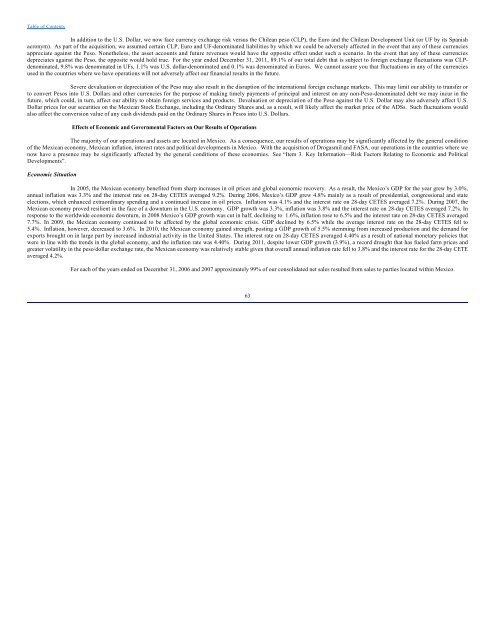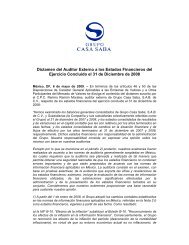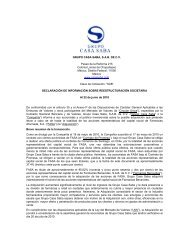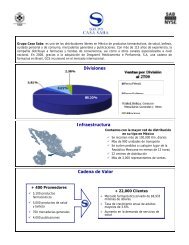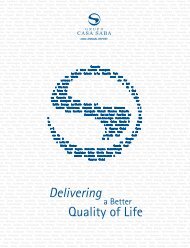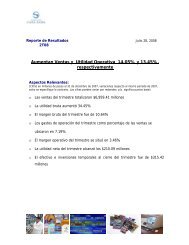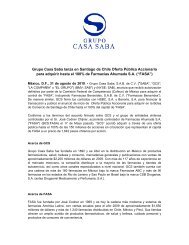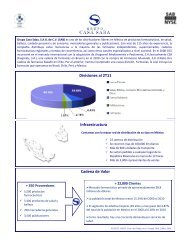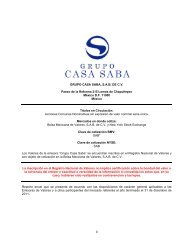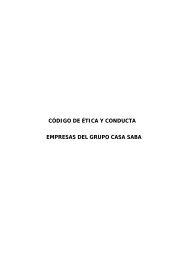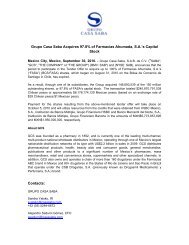FORM 20-F Grupo Casa Saba, S.A.B. de C.V.
FORM 20-F Grupo Casa Saba, S.A.B. de C.V.
FORM 20-F Grupo Casa Saba, S.A.B. de C.V.
Create successful ePaper yourself
Turn your PDF publications into a flip-book with our unique Google optimized e-Paper software.
Table of Contents<br />
In addition to the U.S. Dollar, we now face currency exchange risk versus the Chilean peso (CLP), the Euro and the Chilean Development Unit (or UF by its Spanish<br />
acronym). As part of the acquisition, we assumed certain CLP, Euro and UF-<strong>de</strong>nominated liabilities by which we could be adversely affected in the event that any of these currencies<br />
appreciate against the Peso. Nonetheless, the asset accounts and future revenues would have the opposite effect un<strong>de</strong>r such a scenario. In the event that any of these currencies<br />
<strong>de</strong>preciates against the Peso, the opposite would hold true. For the year en<strong>de</strong>d December 31, <strong>20</strong>11, 89.1% of our total <strong>de</strong>bt that is subject to foreign exchange fluctuations was CLP<strong>de</strong>nominated,<br />
9.8% was <strong>de</strong>nominated in UFs, 1.1% was U.S. dollar-<strong>de</strong>nominated and 0.1% was <strong>de</strong>nominated in Euros. We cannot assure you that fluctuations in any of the currencies<br />
used in the countries where we have operations will not adversely affect our financial results in the future.<br />
Severe <strong>de</strong>valuation or <strong>de</strong>preciation of the Peso may also result in the disruption of the international foreign exchange markets. This may limit our ability to transfer or<br />
to convert Pesos into U.S. Dollars and other currencies for the purpose of making timely payments of principal and interest on any non-Peso-<strong>de</strong>nominated <strong>de</strong>bt we may incur in the<br />
future, which could, in turn, affect our ability to obtain foreign services and products. Devaluation or <strong>de</strong>preciation of the Peso against the U.S. Dollar may also adversely affect U.S.<br />
Dollar prices for our securities on the Mexican Stock Exchange, including the Ordinary Shares and, as a result, will likely affect the market price of the ADSs. Such fluctuations would<br />
also affect the conversion value of any cash divi<strong>de</strong>nds paid on the Ordinary Shares in Pesos into U.S. Dollars.<br />
Effects of Economic and Governmental Factors on Our Results of Operations<br />
The majority of our operations and assets are located in Mexico. As a consequence, our results of operations may be significantly affected by the general condition<br />
of the Mexican economy, Mexican inflation, interest rates and political <strong>de</strong>velopments in Mexico. With the acquisition of Drogasmil and FASA, our operations in the countries where we<br />
now have a presence may be significantly affected by the general conditions of these economies. See “Item 3. Key Information—Risk Factors Relating to Economic and Political<br />
Developments”.<br />
Economic Situation<br />
In <strong>20</strong>05, the Mexican economy benefited from sharp increases in oil prices and global economic recovery. As a result, the Mexico’s GDP for the year grew by 3.0%,<br />
annual inflation was 3.3% and the interest rate on 28-day CETES averaged 9.2%. During <strong>20</strong>06, Mexico’s GDP grew 4.8% mainly as a result of presi<strong>de</strong>ntial, congressional and state<br />
elections, which enhanced extraordinary spending and a continued increase in oil prices. Inflation was 4.1% and the interest rate on 28-day CETES averaged 7.2%. During <strong>20</strong>07, the<br />
Mexican economy proved resilient in the face of a downturn in the U.S. economy. GDP growth was 3.3%, inflation was 3.8% and the interest rate on 28-day CETES averaged 7.2%. In<br />
response to the worldwi<strong>de</strong> economic downturn, in <strong>20</strong>08 Mexico’s GDP growth was cut in half, <strong>de</strong>clining to 1.6%, inflation rose to 6.5% and the interest rate on 28-day CETES averaged<br />
7.7%. In <strong>20</strong>09, the Mexican economy continued to be affected by the global economic crisis. GDP <strong>de</strong>clined by 6.5% while the average interest rate on the 28-day CETES fell to<br />
5.4%. Inflation, however, <strong>de</strong>creased to 3.6%. In <strong>20</strong>10, the Mexican economy gained strength, posting a GDP growth of 5.5% stemming from increased production and the <strong>de</strong>mand for<br />
exports brought on in large part by increased industrial activity in the United States. The interest rate on 28-day CETES averaged 4.40% as a result of national monetary policies that<br />
were in line with the trends in the global economy, and the inflation rate was 4.40%. During <strong>20</strong>11, <strong>de</strong>spite lower GDP growth (3.9%), a record drought that has fueled farm prices and<br />
greater volatility in the peso/dollar exchange rate, the Mexican economy was relatively stable given that overall annual inflation rate fell to 3.8% and the interest rate for the 28-day CETE<br />
averaged 4.2%.<br />
For each of the years en<strong>de</strong>d on December 31, <strong>20</strong>06 and <strong>20</strong>07 approximately 99% of our consolidated net sales resulted from sales to parties located within Mexico.<br />
63


